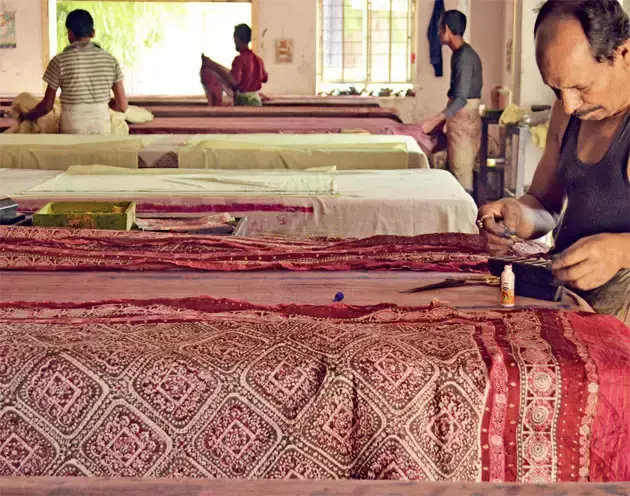
Kaladera Artisans Reuse 20 Lakh Litres of Waste Water per Year
In a remarkable display of innovation and community spirit, the Chhipa artisans of Kaladera, a small town in Rajasthan, India, have developed a unique system to recycle 20 lakh litres of wastewater annually. This remarkable feat is achieved through a combination of rainwater harvesting and recharge wells, which not only reduces the demand for fresh water but also replenishes the groundwater table. This initiative is a shining example of how traditional crafts can tackle local water scarcity with creative, community-driven solutions.
The Chhipa artisans, known for their exquisite hand-block printing skills, have been using traditional Dabu printing techniques for generations. However, their wash water, which is used to clean the blocks and fabrics, posed a significant challenge. The wastewater, rich in textile dyes and other chemicals, was previously discharged into the nearby drainage system, contaminating the water table and posing a threat to the local environment.
In response to this problem, a group of concerned artisans and local residents came together to find a sustainable solution. They realized that rainwater harvesting and recharge wells could be used to collect and filter the wastewater, making it safe for reuse. The initiative was born, and the artisans began to construct rainwater harvesting structures and recharge wells in their communities.
The rainwater harvesting system collects and stores rainwater during the monsoon season, which is then used to wash the blocks and fabrics. The wash water, now free from contaminants, is then filtered through a series of natural and artificial filters, including sand, gravel, and coconut husk. The filtered water is then directed into the recharge wells, which are strategically located near the water table.
The recharge wells are designed to slowly release the filtered water into the groundwater, replenishing the aquifer and reducing the demand for fresh water. This approach not only conserves water but also improves the overall quality of the groundwater, making it safer for drinking and agriculture.
The impact of this initiative has been significant. The artisans have reduced their water demand by 20 lakh litres per year, which is equivalent to the water requirement of over 1,000 households. The recharge wells have also helped to recharge the groundwater table, improving the overall water security of the community.
The Kaladera artisans’ initiative is not only a testament to their resourcefulness and commitment to sustainability but also a model for other communities facing water scarcity. In a region where water is a precious commodity, this project shows that traditional crafts can play a vital role in addressing local water challenges.
The artisans’ approach is also a reminder of the importance of community-driven initiatives in addressing environmental issues. The project was conceived and implemented by the artisans themselves, with minimal external support. This grassroots approach has not only ensured the success of the project but also fostered a sense of ownership and responsibility among the community members.
As the world grapples with the challenges of climate change and water scarcity, the Kaladera artisans’ initiative serves as a beacon of hope. It demonstrates that even in the face of seemingly insurmountable challenges, creative and community-driven solutions can be found. The artisans’ story is a powerful reminder of the importance of collaboration, innovation, and sustainability in addressing the world’s most pressing environmental issues.
Source: https://youtu.be/N6zX0kHVh5U






